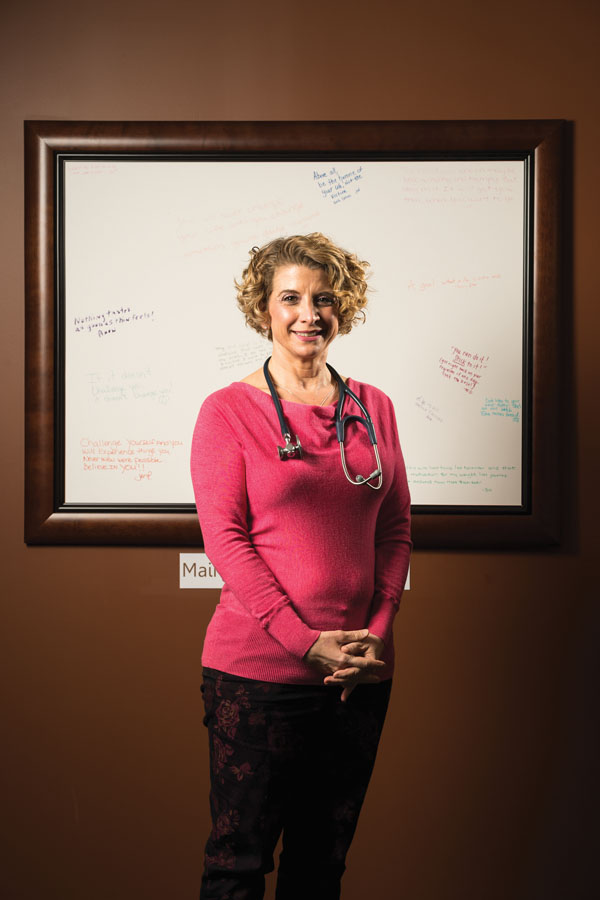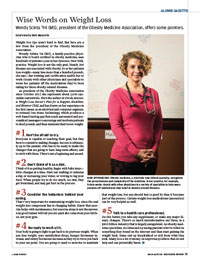Alumni Gazette
 NEW APPROACHES: Obesity medicine, a relatively new clinical specialty, recognizes the pervasiveness and complexity of the
condition. In her practice, for example, Scinta works closely with other physicians in a variety of specialties to help wean
patients off medications they take for obesity-related illnesses. (Photo: J. Adam Fenster)
NEW APPROACHES: Obesity medicine, a relatively new clinical specialty, recognizes the pervasiveness and complexity of the
condition. In her practice, for example, Scinta works closely with other physicians in a variety of specialties to help wean
patients off medications they take for obesity-related illnesses. (Photo: J. Adam Fenster)Weight loss tips aren’t hard to find. But here are a few from the president of the Obesity Medicine Association.
Wendy Scinta ’94 (MS), a family-practice physician who is board certified in obesity medicine, sees hundreds of patients a year in her Syracuse, New York, practice. Weight loss is not the only goal. Nearly 200 diseases are associated with obesity. So as her patients lose weight—many lose more than a hundred pounds, she says—her training and certification enable her to work closely with other physicians and specialists to wean her patients off the medications they’ve been taking for those obesity-related diseases.
As president of the Obesity Medicine Association since October 2017, she represents about 2,000 specialists nationwide. She’s the author of a book, Bounce: A Weight Loss Doctor’s Plan for A Happier, Healthier, and Slimmer Child, and has drawn on her experience in her first career, as an electrical and computer engineer, to cofound One Stone Technology, which produces a web-based texting app that sends automated and personalized messages to encourage and motivate patients to shed pounds, and then maintain their lower weight.
#1 Don’t be afraid to try.
Everyone is capable of reaching their goal, but they have to commit to making changes. Success is ultimately up to the patient, who has to be ready to make the changes that are going to have long-term effects, and to stick with them. There’s not a beginning and an end.
#2 Don’t think of it as a diet.
Think of it as getting healthy. Begin with baby steps—little changes at a time. Start out walking 10 minutes a day, or increasing your water, or vowing to log your food. When people try to do too much, too fast, they get frustrated, and may get hurt in the process.
#3 Consider the behaviors behind your eating.
That’s very important for maintaining weight loss, since the real weight-loss component lies in changing habits. Know that exercise helps with maintenance, but exercise alone is not the answer. Any good trainer will tell you six-pack abs come from your kitchen, not your gym.
#4 Be ready to work at it.
Your body is going to fight to get back to its previous weight. When you lose weight, your metabolism drops, hunger hormones increase, and satiety hormones decrease as they try to force you back to your set point. You are going to need to exercise to maintain that weight loss, but you should feel so good by then it becomes part of the process. Certain weight loss medications (anorectics) can be very helpful as well.
#5 Talk to a health care professional.
Do this before you take any supplement, or make any major dietary changes. There’s so much misinformation out there, in a $300 billion industry that is largely unregulated. As obesity medicine specialists, we often end up seeing patients who’ve relied on something they found on the internet and then start gaining the weight back. Some end up hospitalized or sick from what they took. Many lose a lot of money on unproven products that do not help and can potentially harm.

